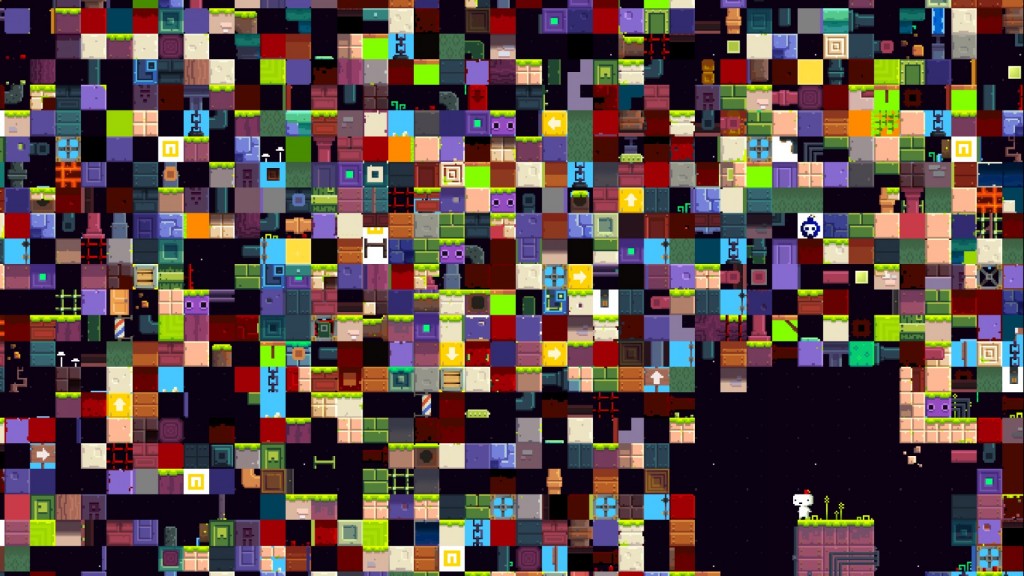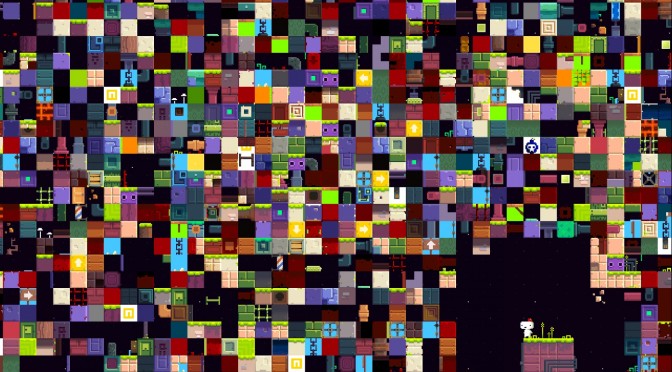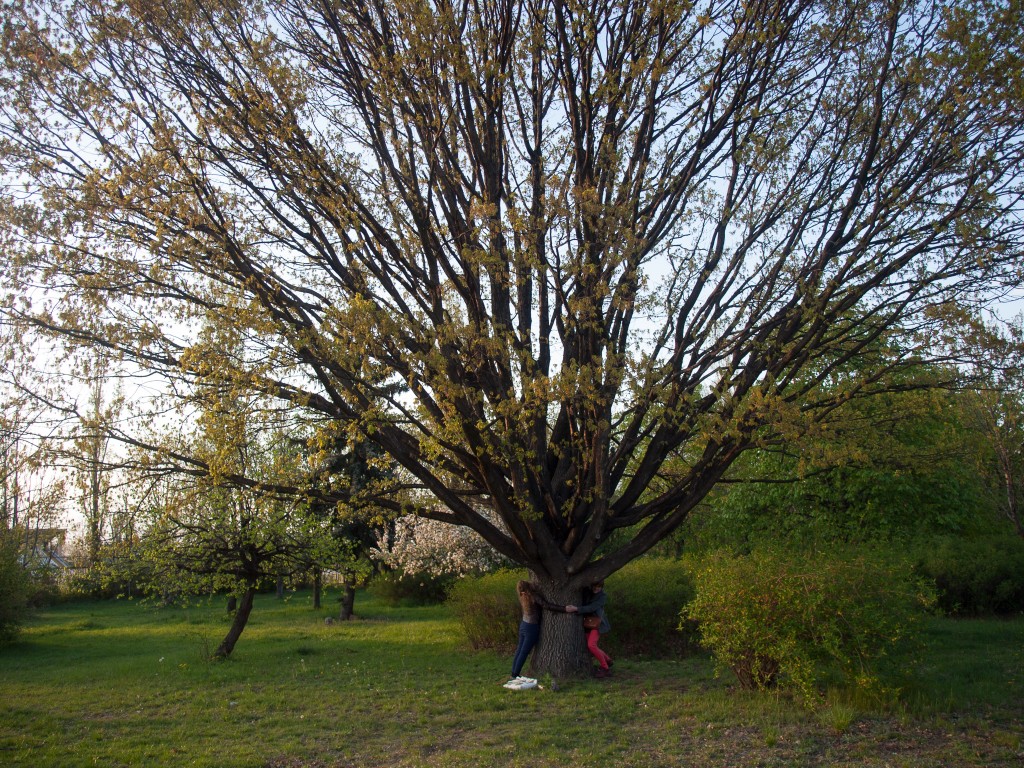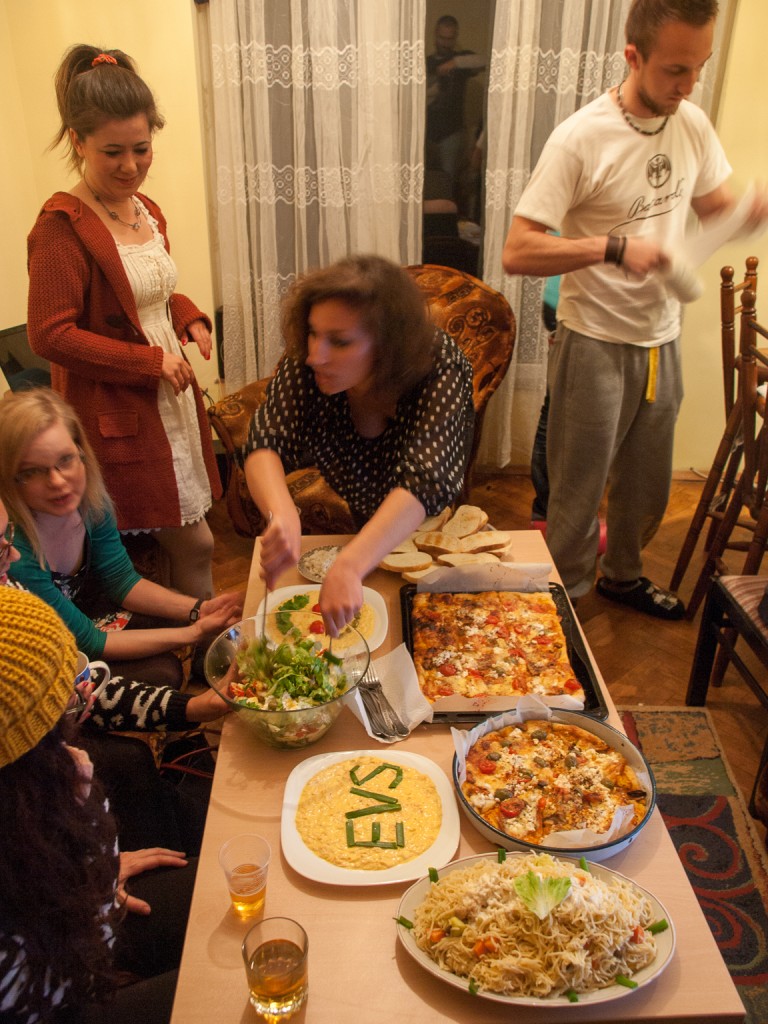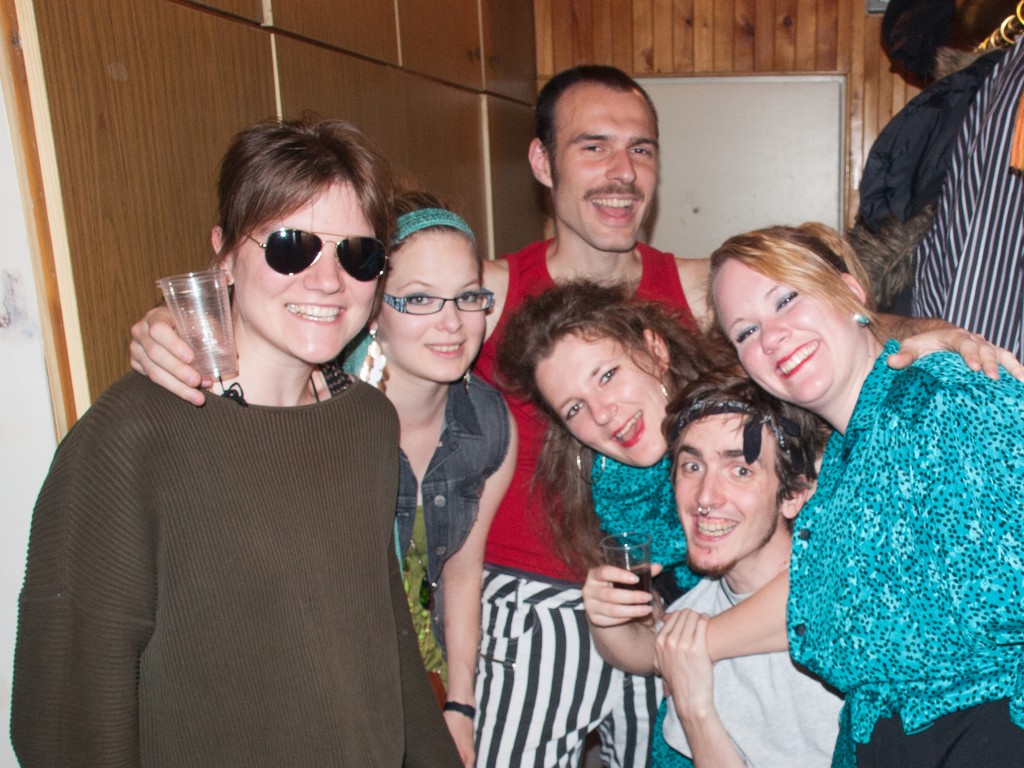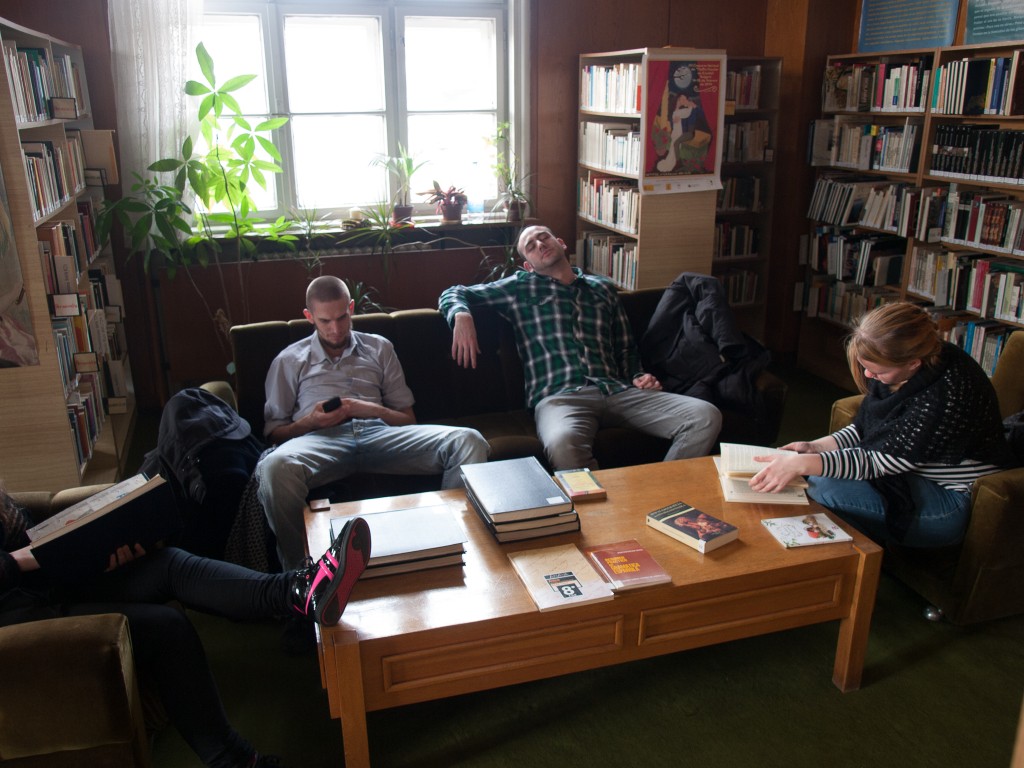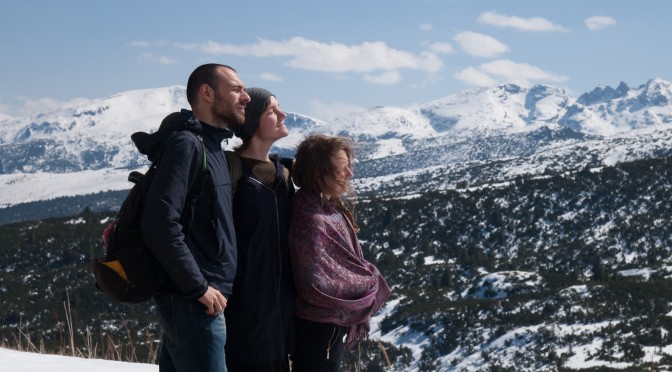It was in our on-arrival training, from Nasko, that we first heard about this place, the Seven Rila Lakes:
 |
There aren’t seven of them in this picture
but you’ll just have to trust us. |
|
Our Lithuanian EVSer friend Rasa, who we also met on the on-arrival, really wanted to see the lakes, so she motivated us to go see them this weekend. Maria and Vicente were unavailable in one way or another, so it was Rasa, Zanda and me who set out to visit the lakes. The decision and “plans” were made only the day before. We met up near our house in Opalchenska, but then had some problems figuring out how we could: 1) make the first step out of Sofia 2) get to the lakes in the first place. Googling around for help wasn’t so useful, either… Sometimes it is like this in Bulgaria: the way to get to any given place is not so obvious, and often even Google isn’t enough for a clear answer, or, even if it is, things can always turn out to be very different in reality, as you’ll soon realise from this “little” story.
The beginning of our trip was just a taste of what was to come: we lost some time in changing buses and getting lost in the outskirts of Sofia that were closest to where we thought the bus or train station of Ovcha Kupel would be, but found no station. Somehow, mostly thanks to our luck and unexpectedly understanding hurried directions in Bulgarian, we got to Gorna Banya train station, where we got our train to Dupnitsa for 4,5lv each.
 |
Gorna Banya railroad lady.
Picture by Zanda. |
1.5 hours later, we were sitting outside Dupnitsa’s train station eating shopska salata and kartofi sas sirene (4,5lv for both), mulling over what we should do next. Our original plan for visiting the lakes, after all was said and done, was to be home not too long after sunset, because Boyan (another EVSer we met in the on-arrival who lives in Sofia) would be having his birthday party that night and we really didn’t want to miss it. It was already 2 o’ clock, however, and we had no idea how much longer it would take us to actually get to those lakes. Finally we discovered a bus to Sapareva Banya, the town closest to the lakes, and hopped on for another 1,40lv, which, contrary to all our previous experience, we paid before getting off the bus, and with no physical ticket left to us to prove it.
 |
Obyadvam v Dupnitsa.
Composition by Zanda. |
So there we were. Sapareva Banya. Home to the Balkans’/Europe’s hottest/something-est geyser (as we briefly had the chance to discover through the bus’ windows) and other hot-water-related activities – it really is a thing in Bulgaria. We were there, but the lakes were still a long way away. If you looked at our relative position using Google Maps, you’d think we were rather close, but we had to also move vertically and somehow climb that imposing mountain right in front of us… We knew there were ski lifts involved, but that was about it. We looked for help and directions in a nearby government building, where after looking around for a bit we eventually found the guard (I had to struggle to keep a straight face while writing that). We asked him “how go seven uuuuh, lakes”, or the equivalent in Bulgarian, and he replied that there was no minibus (as we had let Lonely Planet make us think!) and that the only way up was by taxi. “Where taxi?” He pointed towards the entrance of a shop.
The “taxi” was actually the telephone number of the taxi driver, stuck on the window of the shop. We decided we would ask the man to help us call. We went back and this time there was also a woman there. When we asked her if she knew English, she replied “Deutsch!” I happily started talking to her in German (I wasn’t expecting I’d have to do that when I got out of bed that morning) and explained the situation. She called the taxi for us, offered us coffee, and warned us that the ski lifts might have stopped working soon. We agreed on the price with the driver (18lv to the ski lifts) and rode off for the 15km or so of winding road to the ski lifts.
The taxi driver was a peculiar but funny guy: in his late-thirties, wearing a Metallica t-shirt and having a Beatles song I’d never heard before playing on his taxi’s sound system. I think he misunderstood my saying at some point “mnogo barzo” (very fast): I meant that our visit to the lakes would be very quick, as a reply to something relevant that he had asked me, but he probably interpreted that as permission to start racing up the mountain. He didn’t miss a single opportunity to tell us, in a mixture of lively Bulgarian and very bad English and even German when we didn’t seem to recognise the words in Bulgarian, all about Sapareva Banya -in which he apparently had the monopoly of taxi driving- and the mountain up which we were riding the taxi. He kept repeating the words skala and kamak. At some point he stopped to show us a rock in the shape of a turtle, which when seen from a different angle also looked like a human face. Apart from that, the view was breathtakingly beautiful, on a mountain side dense with forest.
 |
| Turtle Rock |
After we almost crashed on the way, we finally reached the ski lifts. It was 4 o’ clock. 2 hours before, Zanda had said that “she had forgottten there had been a winter this year”, because the weather was so warm that day, all the trees had already blossomed etc. 2 hours later, we were surrounded by snow and people were actually taking the ski lifts for their intended use. We were greeted with the announcement that the ski lifts would be working for just another half hour. That meant that we had to make the decision there and then: give up and go home, cursing our luck, or take the ski lifts and stay on the mountain for the night in a ski lodge we were assured would not cost more than 15lv per person.
We went up.
 |
| “No time to explain – hop on!” |
 |
| View from the ride. |
So we reached the “base camp” for exploring the lakes. But guess what? None of us had expected that our little excursion would involve getting anywhere near snow. Yeah, 2200 or so metres above sea level in March? Never would have guessed… It was still relatively warm (or should I say, not too cold) because the late afternoon sun was still shining and making everything look beautiful, but we were nowhere near prepared enough for this. Thankfully, we all had at least a jacket of some sort wtih us, but no ski boots or anything for hiking in snow. Because the other thing we didn’t really know was that in order to reach the lakes from the hotel/lodge/chalet you had to walk for at least an hour or so. We tried walking up the mountain outside the lodge in our normal shoes before it would have got got dark and found out for ourselves that it definitely wasn’t such a good idea. Still, we had great views and it felt really good climbing this winter wonderland.
 |
| Lodge in the mountains. |
What didn’t feel so good was how we had just decided to not go to Boyan’s party. People started calling to see where we were, because we had told mostly no-one that we’d be visiting the lakes, and absolutely no-one that we’d be staying there for the night, and thus miss the party. It felt bad, especially because we just knew that people would believe that we didn’t care about the party… But we had to make a choice. There will hopefully be many more parties in our lives still. Chances of visiting this extremely beautiful place, on the other hand? Hmmm… Still, even when you make choices like these consciously, you can’t help but feel a little bit of regret.
Anyway, the lodge/chalet had all of its cheaper dormitories booked, mostly by annoying little children *Gargamel face*, so we had to take the 100lv per room per night three-bed one, which we managed to haggle to 90lv. But that room… that room! Its biggest problem was the heating – or the lack thereof. Zanda even resorted to using her Russian, which I hadn’t heard her speak before and I gather she doesn’t want to as a matter of principle, to complain to the manager about it. He came to the room and “turned on” the heating, which meant making the radiator from freezing cold to pleasantly warm to the touch. Yes, our room flirted with temperatures not much higher than zero for the duration of the entire night. But at least we had a television to forget our shivers with. Switching the batteries from one remote control to the other, we managed to tune to Animal Planet – the only channel not in Bulgarian or dubbed in Bulgarian – and had baby pandas, the Summer of the Sharks and Aina the elephant lull us to sleep. Meanwhile, the other animals in the room were about to transform into butterflies in their barely warm enough blanket cocoons.
Fortunately, the next day was much better. We woke up early, had breakfast, rented some ski boots from the basement of the hotel and headed out, ready to find those bloody lakes! The skies were clear and deep blue, the snow was blinding white and deep, the view was magical… It was perfect. And then it happened: we discovered the first lake.
 |
| Pointing at it, in case you missed it. |
It hadn’t seriously crossed our minds that the lakes could have been frozen. When it did, we comforted ourselves by thinking that if they were, somebody of all the people we met on the way would have told us, or would have tried to stop us from going there. But then it made sense: why would anyone want to stop us when we were showing such determination and conviction? The locals must have thought that we must have known that the lakes were frozen, and that we simply didn’t care.
An hour and a half or so after we started hiking from the lodge, we reached the second lake (we even walked over it) and another lodge next to it. There we had some tea and cherished our moments in the frozen wilderness. Yes, the lakes were frozen, but we had made it, and that was the only thing that counted.
 |
| Composition by Zanda. |
To cut this long story short, by the time we had reached the ski lifts to begin what we thought would be the long way home, we were already happy and satisfied with the way things had turned out.
But the cherry on the cake had yet to come.
Even though we had the taxi guy’s telephone number safely in our phones, we really didn’t want to strain our wallets any further, and so preferred to try our luck with hitch-hiking all the way back, which was the original plan actually. So we signalled to the first car which was looking like it was about to leave the area of the ski lift, ran to it and asked the couple -that could have been our parents- if it would be okay for them to take us to Sapareva Banya. Not only did they take us there, they got us lunch at Hotel Panorama in Panichishte -some of the best food we’ve had while we’ve been in Bulgaria – and told us that they could also take us all the way back to Sofia, since that was their final destination as well. If they were chainsaw murderers, they kept their hobby to themselves.
Another thing that made me personally proud of our contact with this couple was that 90% of our communication with them, like in most of the trip actually, was in Bulgarian. When all you want to do is express you gratitude, you don’t care about how correct your language is; you just blurt out whatever you know, even if it’s just words, phrases, or saying mnogo mnogo vkusno, mnogo mnogo blagodarim vi!
 |
| 2500g of guyvetch-y goodness for five people… |
 |
Only later did we realise that this picture
Zanda took was of the couple that would
buy us lunch and drive us back home to Sofia…
We decided that we should send it to them
to show them our appreciation. |
This was our Sedemte Rilski Ezera adventure. It was a very inspiring trip to us, as you can probably tell by the length of this story and the compositions by Zanda (here’s a link to ther facebook album of our trip). For me it captured nicely the spirit of EVS and travelling in Bulgaria: international friends, looking for spontaneous adventure and a more deeper understanding of their host country, at the same time discovering all of its treasures and short-comings and that in the end it’s the people that matter the most. We might not have exactly found what we were looking for, but what we got in return proved to be just as valuable, if not more. And in the end we also got to see Boyan and tell him happy birthday, for his real birthday was two days after the party. Τέλος καλό, όλα καλά.
Oh, and another thing before I sign off that I keep having to learn again and again:
if in doubt, always ask.
